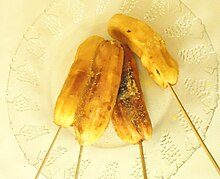Ginanggang: Difference between revisions
Appearance
Content deleted Content added
Pansitkanton (talk | contribs) No edit summary |
Pansitkanton (talk | contribs) |
||
| Line 8: | Line 8: | ||
*[[Banana cue]] |
*[[Banana cue]] |
||
*[[Camote cue]] |
*[[Camote cue]] |
||
*[[Turrón (Filipino cuisine)| |
*[[Turrón (Filipino cuisine)|Turon]] |
||
*[[Maruya (Filipino cuisine)|Maruya]] |
*[[Maruya (Filipino cuisine)|Maruya]] |
||
Revision as of 19:45, 20 October 2013
This article needs additional citations for verification. (March 2013) |

Ginanggang, guinanggang, or ginang-gang (Cebuano: [ginaŋ'gaŋ]) is a snack food of grilled skewered bananas brushed with margarine and sprinkled with sugar. It originates from the island of Mindanao in the Philippines.[1]
Ginanggang is made from a type of banana in the Philippines called saba (A cooking banana also known as the Cardaba banana). The banana is peeled, skewered and then grilled over charcoals. When the outer surface is lightly charred, it is then taken off the grill, brushed with margarine, and sprinkled with sugar. It differs from banana cue in that the banana is actually grilled on the stick. The sugar used on it is also white table sugar and is not caramelized (being applied after cooking).
See also
References
- ^ "Filipino Street Foods". http://lutongpinoy.info. Retrieved 27 December 2010.
{{cite web}}: External link in|publisher=


